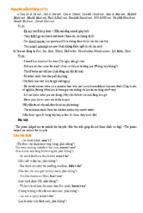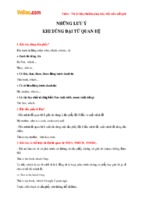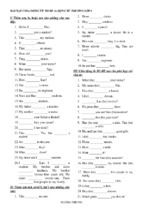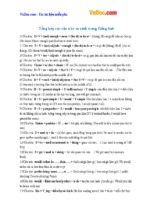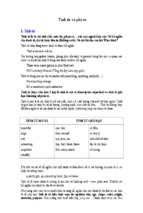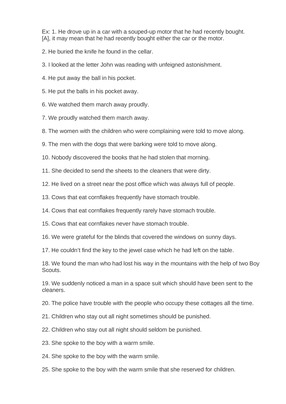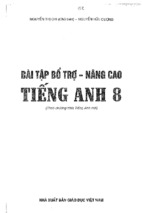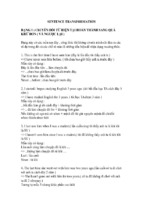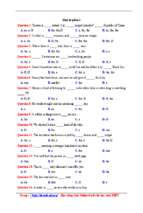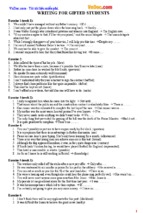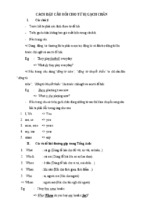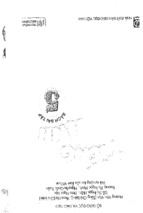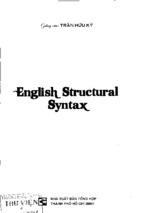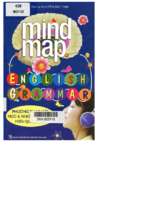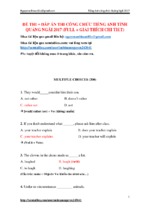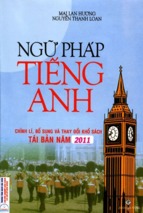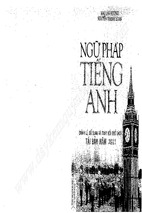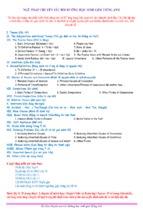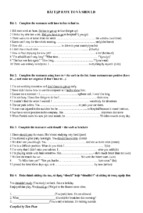Table of Content1
First Certificate in English
Michael Vince
Dịch và biên soạn:
[email protected]
[email protected]
Table of Content2
Table of Content
Unit 1 Past time.........................................................................................................................................2
Unit 2 Present perfect................................................................................................................................6
Unit 3 Future time...................................................................................................................................11
Unit 4 Present time..................................................................................................................................14
Unit 5 Progress test (Unit 1, 2, 3, 4)........................................................................................................17
Unit 6 Indirect speech.............................................................................................................................20
Unit 7 Conditionals.................................................................................................................................25
Unit 8 Hypothetical and unreal tenses....................................................................................................29
Unit 9 Passive voice................................................................................................................................33
Unit 10 Progress test 2 (Unit 6, 7, 8, 9)...................................................................................................38
Unite 11 Relative Clauses.......................................................................................................................42
Unit 12 Prepositions................................................................................................................................47
Unit 13 Expressing purpose, result, and contrast....................................................................................51
Unit 14 Time expressions........................................................................................................................55
Unit 15 Progress test (Unit 11, 12, 13, 14)..............................................................................................59
Unit 16 Modal auxiliaries, present and future: ability, certainty, obligation...........................................62
Unit 17 Modal auxiliaries, past: ability, certainty, obligation.................................................................64
Unit 18 Language functions 1.................................................................................................................69
Unit 19 Language function 2...................................................................................................................72
Unit 20 Progress test (Unit 16, 17, 18, 19)..............................................................................................74
Unit 21 Countables and uncountables. Problems with plurals................................................................77
Unit 22 Articles.......................................................................................................................................82
Unit 23 All, no, each, every, either, neither, none...................................................................................87
Unit 24 Making comparisons..................................................................................................................91
Unit 25 Progress test (Units 21, 22, 23, 24)............................................................................................95
Unit 26 Phrasal verbs 1...........................................................................................................................98
Unit 27 Phrasal verbs 2.........................................................................................................................103
Unit 28 Verbs followed by infinitive or gerund and that clause...........................................................108
Unit 29 Prepositions following verbs and adjectives............................................................................111
Unit 30 Progress test (Unit 26, 27, 28, 29)............................................................................................114
Unit 31 Inversion and question tags......................................................................................................116
Unit 32 Expressing reason, text organizers...........................................................................................119
Unit 33 It and there, it and adjectives, one, someone etc, what, whatever, possessives and reflexives122
Unit 34 Spelling and pronunciation......................................................................................................126
Unit 35 Progress test (Unit 31, 32, 33, 34)............................................................................................128
Unit 36 Final test...................................................................................................................................129
[email protected]
Table of Content3
Unit 1 Past time
Narrative
(Văn tường
thuật)
Explanations
1. Main events
The Past Simple is used to describe finished
events in the past.
Susan went into the station and bought a
ticket.
2. Background description
1. Sự kiện chính
2.
The Past Continuous is used to describe
actions still in progress, and is used for
background description.
There were a lot of people waiting in the
station. Some were sleeping on the benches,
and others were walking up and down. Susan
was looking for Graham, so she didn’t sit
down.
3. Past before past
3.
The Past Perfect is used to describe a past
event which took place before another past
event.
By the time the train arrived, Susan had
managed to push her way to the front of the
crowd.
It is not always necessary if a time
expression makes the order of events clear.
Before the train arrived, Susan managed to
push her way to the front of the crowd.
4. Interrupted Past Continuous
4.
We often contrast an action still in progress
with a sudden event which interrupts it.
While Susan was trying to get into the
platform, a man grabbed her handbag.
5. Participle clauses
5.
Participle clauses are introduced by the time
expressions before, after, and while. They
have the same subject as the following
clause.
After struggling with him, Susan pulled the
bag from his hands.
Habits in the
past. (Thói
quen trong
quá khứ)
1. Past Simple
1.
The Past Simple is used to describe past
habits or states. A time expression is usually
necessary.
I always got up at six those days. (Habit)
I lived in Austria for several years. (State)
2. Used to
Used to is used to describe past habits,
[email protected]
2.
Thì quá khứ đơn được dùng để mô
tả hành động đã kết thúc trong quá
khứ.
Susan đã đi đến nhà ga và mua một
chiếc vé.
Mô tả bối cảnh
Quá khứ tiếp diễn được dùng đề mô
tả hành động đang xảy ra trong quá
khứ, và được dùng để mô tả bối
cảnh.
Có rất nhiều người đang đợi trong
nhà ga, vài ngườ đang ngủ trên
ghế, những người khác đang đi tới
đi lui. Susan đang tìm Graham, cho
nên cô ấy không ngồi.
Quá khứ trước quá khứ
Quá khứ hoàn thành được dùng để
mô tả hành động xẩy ra trước một
hành động khác trong quá khứ.
Trước khi tàu đến, Susan đã len
chân được về phía trước đám đông.
Không cần thiết phải dùng quá khứ
hoàn thành nếu trạng ngữ chỉ thời
gian làm cho trật tự của những hành
động đó rõ rang.
Trước khi tàu đến, Susan đã len
chân được về phía trước đám đông.
Quá khứ tiếp diễn
Quá khứ tiếp diễn thường được
dung để điễn tả hành động đang tiếp
diễn thì hành động khác xen vào.
Đang khi Susan cố gắng bước lên
tàu, thì một người đàn ông giật túi
sách của cô ấy.
Mệnh đề phân từ
Mệnh đề phân từ thường bắt đầu
bằng các thành ngữ như: before,
after, while. Hai chủ ngữ trong
mệnh đề phải giống nhau.
Sauk hi vật lộn với tên trôm, Susan
đã lấy được túi sách của mình từ
tay kẻ cắp.
Quá khứ đơn
Quá khứ đơn dùng mô tả thói quen
hoặc tình trạng trong quá khứ. Cần
có thành ngữ chỉ thời gian đi cùng.
Hồi đó tôi luôn ngủ rậy lúc 6 giờ.
(thói quen)
Tôi đã sống ở Úc trong nhiều năm.
(trạng thái)
Used to
Used to thường được dung để mô tả
Table of Content4
usually in contrast with the present. A time
expression is not necessary.
I used to get up at six, but now I get up at
eight.
Used to can also describe past state.
I used to own a horse. (I owned a horse once)
Note these forms of used to:
Did you use to swim every day?
3. Would
Would is used to describe a person’s typical
activities in the past. It can only be used to
describe repeated actions, and is mainly used
in writing, and in personal reminiscences.
Every evening was the same. Jack would
turn on the radio, light his pipe, and fall
asleep.
4. Past Continuous
The Past Continuous can be used to describe
a repeated action in the past, often an
annoying habit. A frequency adverb is
necessary.
When Peter was younger, he was always
getting into trouble
Politeness and
uncertainty
(Lịch sự và sự
không chắc
chắn)
The Past Continuous with the verb wonder
has a polite meaning.
I was wondering if you could help me.
With the verb think the Past Continuous
suggests uncertainty.
I was thinking of having a party next week.
thói quen trong quá khứ, thường
tương phản với hiện tại. Không cần
có trạng ngữ chỉ thời gian.
Tôi thường ngủ rậy lúc 6 giờ,
nhưng giờ tôi rậy lúc 8 giờ.
‘Used to’ có thể được dung để mô tả
tình trạng trong quá khứ
Tôi đã có một con ngựa. (Tôi đã
một lan sở hữu một con ngựa)
Chú ý mẫu câu sau:
Did you use to swim every day?
3. Would
Would được dung để mô tả đặc
trưng của ai đó trong quá khứ. Nó
có thể chỉ để mô tả hành động lập đi
lập lại, và chủ yếu được dùng trong
văn viết, hay trong hồi ký.
Tối nào cũng vậy, Jack bật đài lên,
châm một điếu thuốc lào và đi ngủ.
4. Quá khứ tiếp diễn
Quá khứ tiếp diễn được dùng đề mô
tả hành động lập đi lập lại trong quá
khứ, thường là thói quen phiền
phức. Phải có trạng từ chỉ tần suất
đi cùng.
Khi còn trẻ, Peter luôn luôn gặp
rắc rối.
1. Quá khứ tiếp diễn với động từ
‘wonder’ mang ý nghĩa lễ phép.
Em đang băn khoăn nếu anh có thể
giúp em.
Với động từ ‘think’, thì quá khứ
tiếp diễn chỉ ra sự không chắc chắn.
Em đang khoăn về việc tổ chức một
bữa tiệc vào tuần tới.
Activities
1
Choose a
suitable
description for
each picture.
a) When he left the house, Peter forgot that he had put his passport and wallet in his other
jacket.
b) After phoning the airport, Peter packed his suitcase.
[email protected]
Table of Content5
c) When he returned from Portugal in March, Peter put his passport and wallet in his jacket
2
Choose the
most suitable
tense. The
first one is
done for you.
3
Put each verb
in brackets
into a suitable
tense. All
sentences
refer to past
time. Only use
the Past
Perfect where
this is
absolutely
necessary.
4
Decide
whether the
tense
underlined is
suitable or
not.
5
Put each verb
in brackets
into a suitable
past tense.
pocket.
d) A few days before leaving for his summer holiday, Peter phoned the airport to check his
flight.
e) While Peter was packing his suitcase, he realised that he hadn't checked his flight.
f) While Peter was packing his suitcase, the phone rang.
a) I suddenly remembered that I forgot/had forgotten my keys.
b) While Diana watched/was watching her favourite television programme, there was a
power – cut.
c) Tom used to/would live in the house at the end of the street.
d) Who was driving/drove the car at the time of the accident?
e) By the time Sheila got back, Chris went/had gone.
f) David ate/had eaten Japanese food before, so he knew what to order.
g) I did/was doing some shopping yesterday, when I saw that Dutch friend of yours.
h) I used to like/was liking sweets much more than I do now.
i) What exactly were you doing/did you do when I came into your office yesterday?
j) Laura missed the party because no – one was telling/had told her about it.
Tanya would/used to be a doctor.
a) While I (try) ................ to get my car started, a passing car (stop) ................ and the
driver (offer) ................ to help me.
b) The police (pay) ................ no attention to Claire’s complaint because she
(phone) ................ them so many times before.
c) Mary (not wear) ................ her glasses at the time, so she (not notice) ................ what
kind of car the man (drive) ................ .
d) Nick (lie) ................ down on the grass for a while next to some tourists who
(feed) ................ the ducks.
e) Tony (admit) ................ that he (hit) ................ the other car, but said that he (not
damage) ................ it.
f) Sorry, I (not listen) ................ to you. I (think) ................ about something else.
g) Helen (feel) ................ very tired, and while she (finish) ................ her studying, she
(fall) ................ asleep.
h) The police (get) ................ to Claire’s house as fast as they could, but the burglar
(disappear) ................ .
i) I (phone) ................ you last night but you (not answer) ................ . What (you
do) ................ ?
j) We (not go) ................ out yesterday because it (rain) ................ .
a) While I had a bath, someone knocked on the door. ................
b) Sally didn’t go to a boxing match before. ................
c) Harry tried to repair the car, but he didn’t really know what he was doing. ................
d) What did you wear to the Ponsonbys’ party? ................
e) Were you eating spaghetti every day when you lived in Italy? ................
f) I didn’t know you had bought a new car. ................
g) They all wanted to believe her, but suspected she was lying. ................
h) As Peggy walked home, she tried to remember what happened. ................
i) ‘What a terrible day!’ thought Lucy. Everything had gone wrong! ................
j) Although it rained a lot. I was enjoying my holiday last year. ................
When Professor Mallory, the famous archaeologist, (1) ................ (invite) me to take part in
his expedition to find the Lost City of the Himalayas, I (2) ................ (not hesitate) to accept
his invitation. Mallory (3) ................ (discover) an ancient map showing the position of the
city, although no European (4) ................ (ever go) to the area before. In fact, most of the
Mallory’s colleagues in Oxford either (5) ................ (believe) that the city (6) ................
(never exist) or (7) ................ (feel) that it (8) ................ (vanish) long ago and simply
(7) ................ a legend. According to the Professor, the builders of the city (10) ................
(hide) it among the mountains in order to protect its immense riches. He (11) ................
(believe) that the descendants of these ancient people (12) ................ (still keep) themselves
[email protected]
Table of Content6
6
Rewrite each
sentence,
beginning as
shown, using
a participle
clause.
KEYPOINTS
apart from the rest of mankind for the very same reasons. So when we (13) ................ (set
off) on a cool May morning towards the distant mountains, each of us (14) ................ (look
forward) to exciting discoveries. For a week or more we (15) ................ (climb) higher and
higher, following the map, which Mallory (16) ................ (study) from time to time. Then
one afternoon, while we (17) ................ (rest) at the top of a valley, we (18) ................
(notice) that a rider on a horse (19) ................ (wave) at us from the other side of the valley.
A rider whose clothes (20) ................ (shine) like gold!
a) Norman collected the parcel. Then he realized it was the wrong one.
After ................ ................ ................ ................ ................ ................ ................
b) Sue left the house. But first she checked that she had her keys.
Before ................ ................ ................ ................ ................ ................ .............
c) Mark was parking his car when he noticed the wing – mirror was broken.
While ................ ................ ................ ................ ................ ................ ..............
d) Julia cleaned the house. Then she fell asleep on the sofa.
After ................ ................ ................ ................ ................ ................ ...............
e) Brian bought a new television. First he checked all the prices.
Before ................ ................ ................ ................ ................ ................ .............
f) Alan was skiing in Switzerland. He met his old friends, Ken.
While ................ ................ ................ ................ ................ ................ ...............
g) Kate took two aspirins, and then she felt a lot better.
After ................ ................ ................ ................ ................ ................ ................
h) Sheila went out for the evening, but first she washed her hair.
Before ................ ................ ................ ................ ................ ................ ..............
i) Michael was taking a bath when he heard someone at the door.
While ................ ................ ................ ................ ................ ................ ...............
j) First Trudy read the book. Then she decided that she didn’t like it.
After ................ ................ ................ ................ ................ ................ ................
1. The Past Simple describes events in the 1. Quá khứ đơn mô tả những sự kiện trong
past, such as the main event in a
quá khứ, như là những sự kiện chính
narrative. It can also describe habits and
trong một câu chuyện. Quá khú đơn
routines in the past.
cũng dùng để mô tả công việc hằng ngày
hoặc thói quen trong quá khứ.
2. The Past Continuous is used for:
2. Thì quá khứ tiếp diễn được dùng để:
a) Background description.
a) Mô tả bối cảnh.
b) Actions in progress, often
b) Hành động đang xảy ra, thường
contrasted with a sudden event.
The Past Continuous cannot be used to
tương phản bởi một hành động khác
describe past routines and habits.
xen vào.
3. Participle clauses can introduce a clause 3. Mệnh đề phân từ dùng để giới thiệu
giving the main event.
mệnh đề chính.
The subjects of both clauses must be the
Chủ ngữ của mệnh đề chính và mệnh đề
same.
phụ phải là một.
4. The Past Perfect describes a past event
4. Thì quá khứ hoàn thành mô tả sự kiện
which took place before another past
xảy ra trước một sự kiện khác trong quá
event. If before or after is used, the Past
khứ. Nếu có before hoặc after, thì Thì
Perfect is optional.
quá khứ hoàn thành là tùy ý.
The Past Perfect is not used to show that
Thì quá khứ hoàn thành không được
an event happened a long time ago in the
dùng để mà chỉ ra một sự kiện dã xảy ra
past.
từ rất lâu trong quá khứ.
5. Used to only refers to past time, and has 5. Used to chỉ dùng với quá khứ, không có
no present form.
mẫu câu ở hiện tại.
6. Would can be used to describe habitual
6. Would có thể được dùng để mô tả hành
actions in the past, usually in writing,
động thói quen trong quá khứ, thường
but not when they are contrasted with
trong văn viết, nhưng không được dùng
the present. Compare:
khi những thói quen đó tương phản với
Jim would always make his mother a
hiện tại. So sánh:
cup of tea after lunch.
Jim luân làm cho mẹ mình một cốc trà
[email protected]
Table of Content7
Jim used to drink tea, but now he
prefers coffee.
Would cannot be used to describe state:
Sally used to be a dancer.
sau bữa trưa.
Jim thương uống trà, nhưng giờ anh ấy
thích cà phê hơn.
Would không dùng để môt ả trạng thái.
Sally đã từng là vũ công.
Unit 2 Present perfect
Recent
events
Indefinite
events
Extended or
repeated
events (Hành
động kéo dai
hoặc hành
động lập đi
lập lại)
Explanations
Present Perfect Simple is used to
describe recent events without a
definite time. The idea of time or
place in the speaker’s mind makes
the event recent. A time expression
may emphasise recentness.
I’ve left my shopping bag behind.
I’ve just broken my watch.
We can also describe events that have
not happened.
I haven’t found her phone number
yet.
The event may be connected with the
present, because the result of the
event is present. No definite time is
given for the event.
I’ve broken my arm. As you can see.
1. Present Perfect Simple
No definite time is given for the
event.
I’ve been to France three times.
2. Compared with Past Simple
Events described using the Past
Simple have definite time.
I went to France last year.
The tense used can depend on the
time expression.
This is the first time I have eaten
Japanese food.
3. Definite places
If we think of a definite place for an
event, this may suggest a definite
time.
I left my shopping bag on the train
1. Present Perfect Simple
With verbs that describe states, the
Present Simple describes a state
which lasts up to the present.
I’ve lived in this house for five years.
2. Present Perfect Continuous
The Present Perfect Continuous can
also describe a state while lasts up to
the present moment.
I’ve been living in this house for five
years.
There is little difference of meaning
[email protected]
Thì hiện tại hoàn thành được dung để chỉ
những hành động đã xảy |am à không có
thời gian xác định. Thời gian hoặc. nơi chốn
ở trong đầu người nói và làm cho hành động
đó xảy ra gần đây. Trạng ngữ chỉ thời gian
có thể nhấn mạnh sự việc đó xảy ra gần đây.
Tôi đẻ quên mất túi sách của tôi rồi.
Tôi vừa làm vỡ cái đồng hồ của tôi.
Chúng ta cũng có thể mô tả những sự kiện
mà nó chưa xảy ra.
Tôi vân chưa tìm thấy số điện thoại của cô
ấy.
Sự kiện có thể có mối liên hệ với hiện tại,
bởi vì kết quả của hành động đó ở hiện tại.
Không có thời gian xác định cho hành động
này.
Tôi vừa gẫy tay. Như anh thấy đấy.
1. Thì hiện tại hoàn thành
Không có thời gian xác định co sự kiện.
Tôi đã đi Pháp ba lần.
2. So sánh với quá khứ đơn.
Sự kiện mô tả sử dụng quá khứ đơn thì có
thời gian xác định.
Tôi đã đi Pháp năm ngoái.
Thì được sử dụng có thể phụ thuộc vào trạng
ngữ chỉ thời gian.
Đây là lần đầu tiên tôi ăn thức ăn Nhật Bản
3. Nơi chỗn xác định
Nếu chúng ta nghĩ về một nơi xác định cho
một sự kiện nào đó, điều này có thể chỉ ra
một nơi xác định.
Tôi đã để quên túi mua sắm ở trên tầu.
1. Hiện tại hoạn thành
Với những động từ mô tả trạng thái, thì Hiện
tại hoàn thành môt tả một trạng thái kéo dai
tới hiện tại.
Tôi đã sống đã sống ở ngôi nhà này được 5
năm.
2. Thì hiện tại hoàn thành tiếp điễn
Thì hiện tại hoàn thành tiếp diễn cũng có thể
dùng để để diễn tả một trạng thái kéo dài cho
đến hiện tại.
Tôi đã sống ở ngôi nhà này được 5 năm rồi.
Có một ít sự khác biệt giữa thì hiện tại hoàn
thành và thì hiện tại hoàn thành tiếp diễn
Table of Content8
between Simple and Continuous in
this case, or with How long
questions. The verbs sit, wait, lie,
stay prefer the Present Perfect
Continuous.
How long have you been waiting?
3. Present Perfect Simple
The Present Perfect Simple can
describe a habitual action in a period
of time up to the present moment.
I’ve never worn a tie to work, and I
refuse to start now!
For, since,
ago
Contrast
between
Simple and
Continuous
trong trường hợp này. Đó là câu hỏi với How
long và với các động từ sit, wait, lie, stay thì
ta thường dùng thì hiện tại tiếp diễn hơn.
Em đã đợi anh lâu chưa?
3. Thì hiện tại hoàn thành
Thì hiện tại hoàn thành có thể được dùng để
diễn tả một hành động theo thói quen trong
một khoảng thời gian kéo dài cho đến hiện
tại.
Tôi chưa bao giờ đeo ca vát đi làm, và tôi
không có dự định đeo từ bây giờ.
See unit 14
1. Not completed
Use of the Present Perfect
Continuous can suggest that an action
is not completed, or has recently
finished.
We’ve been walking for hours! Let’s
have a rest.
I’ve been digging the garden. That’s
why I’m so dirty.
2. Completed
Use of Present Perfect Simple can
show that an action is complete.
Giving the number of actions
suggests completion.
I’ve written ten pages of my
homework assignment!
Activities
1
Choose a
suitable
description
for each
picture.
1. Chưa hoàn thành
Việc sự dụng thì hiện tại hoàn thành tiếp
diễn chỉ ra rằng hành động đó là chưa hoàn
thành hoặc vừa mới kết thúc.
Chúng tôi đã đi bộ hang giờ rồi, nghỉ một tý
đi.
Tôi vừa mối đào vườn xong, đó là lý do tại
sao tôi bẩn thế này.
2. Đã Hoàn thành
Việc sử dụng thì hiện tại hoàn thành có thể
chỉ ra cho chúng ta thấy rằng hành động đó
là đã hoàn thành. Chỉ ra số hành động đã
hoàn thành.
Tôi đã viết được mười trang bài tập lớn rồi!
l) Did you enjoy the match?
2) Have you enjoyed the match?
1) What have you been doing?
2) What have you done?
1) He was married six times.
2) He has been married six times.
[email protected]
Table of Content9
1) How long have you been here?
2) How long are you here for?
1) I've been waiting for two hours.
2) I waited for two hours.
1) Where did Wendy go?
2) Where has Wendy been?
2
Choose the
most suitable
tense
a) Did you see/Have you seen my bag anywhere? I can’t find it.
b) Larry is writing/has been writing/has written his novel for the last two years without
getting further than Chapter One.
c) From the minute he got up this morning, Cary asked/has been asking/has asked silly
questions!
d) Have you given/Did you give Helen my massage when you have seen/saw her?
e) Sorry, could you say that again? I didn’t listen/haven’t listened/have not been listening to
you.
f) The police think that they found/have found your missing wallet, so call this number.
g) I don’t think we’ll go swimming after all because the weather changed/has changed/has
3
Put the verb
in brackets
into a
suitable
tense.
h)
i)
j)
a)
b)
c)
d)
e)
f)
g)
h)
i)
j)
4
a)
been changing.
How was your holiday in Italy? Did you visit/Have you visited lots of interesting places?
Did you two meet/Have you two met before? Eric, this is Amanda.
Did you meet/Have you met anyone interesting at the reception?
I’m sorry about not coming last week. I (have) ……… a cold and so I (stay) … at home.
Wait a minute. I (have) ……… an idea. Let’s go and see Roger. We last (see) ……… him
a long time ago.
It’s nice to be back here in London. This is the second time I (come) ……… here.
I’m phoning about your advertisement for a bicycle for sale, which I (see) ……… in the
local paper. (you/sell) ……… it? Or is it still available?
This place is a terrible mess! What on earth (you/do) ………?
And now for an item of local news. Hampshire police (find) ……… the dangerous snake
which (go) ……… missing earlier in the week.
This tooth (kill) ……… me lately! So I (make) ……… an appointment with the dentist
for Tuesday.
I can’t give you the report I (promise) ……… for today because I (not finish) ……… .
Harry (not look) ……… well since he (go) ……… on diet.
It says in the paper that they (discover) ……… oil in Wales. They (look for) ……… for
ages.
I haven’t seen Gary for/since a long time. How is he?
[email protected]
Table of Content10
Choose the
most suitable
time
expression.
5
Rewrite each
sentence,
beginning as
shown, so
that the
meaning
stays the
same.
6
Put each verb
in brackets
into either
the Present
Perfect
Simple or
Present
Perfect
Continuous.
7
Put each verb
in brackets
into the Past
Simple,
Present
Perfect
Simple, or
Present
Perfect
Continuous.
b)
c)
d)
e)
f)
g)
h)
i)
j)
a)
It’s ages ago/since I last went to a football match.
I’ve written to Beborah last week/recently.
What have you been doing today/yesterday?
Have you eaten Italian food before/already?
I’ve been living here in/since the end of last year.
Actually I had dinner with Sue last night/lately.
I’ve been trying to get in touch with David for ages/for the last time.
Terry hasn’t been to Edinburgh since/when we went there together.
I can’t remember how long/when I’ve had this watch.
Steve started learning the violin a month ago.
Steve has been learning the violin for a month.
b) I haven’t been to an Indian restaurant for ages.
It’s ages …
c) When she heard the results, Mary began to feel more confident.
Since hearing the results …
d) The last time Nancy came here was in 1986.
Nancy hasn’t …
e) This is my first visit to Japan.
This is the first time …
f) How long have Helen and Robert been married?
When …
g) Jack bought those trousers last month, and has been wearing them ever since.
Jack has …
h) It’s long time since our last conversation.
We …
i) Thanks, but I had something to eat earlier.
Thanks, but I’ve …
j) This is my first game of water – polo.
I…
a) Someone (eat) ……… all the cakes. I’ll have to buy some more.
b) What (you buy) ……… your sister for her birthday?
c) My throat is really sore. I (sing) ……… all evening.
d) Brenda (learn) ……… Russian, but she finds it difficult.
e) How many people (you invite) ……… to your party?
f) Those two cats (sit)……… on that branch for the last hour.
g) It (rain) ……… all day! Why can’t it stop!
h) Diana (wear) ……… twelve different dresses in the past week!
i) I (do) ……… everything you asked. What should I do now?
j) Graham and Pauline (try) ……… to find a house for ages, but they can’t find one they
can afford.
It was announced in London this morning that the British Oil Corporation (1) ………
(discover) oil under the sea near the Welsh coast. The company, which (2) ……… (drill) for
oil in the area since 1990, (3) ……… (find) small amounts of oil near Swansea last month,
and since then (4) ……… (discover) larger amounts of oil under the sea – bed nearby. Last
year the government (5) ……… (lend) over £50,000,000 to BOC, and (6) ……… (give)
permission for the company to build an oil refinery and other facilities in South Wales. The
reaction of local people to today’s news (7) ……… (be) mixed so far. Local MPs (8) ………
(already welcome) the news, pointing out that the oil industry will bring badly needed jobs to
the area. But local residents are worried about the danger of pollution. ‘Nobody (9) ………
(ask) us yet what we want,’ said Ann Griffiths, leader of the Keep Out The Oil Campaign.
‘Look what (10) ……… (happen) when they (11) ……… (find) oil in Scotland in the 1960s.
The oil companies (12) ……… (get) rich, not the local people. BOC (13) ……… (not tell) us
the truth about what this going to mean for our people.’ A BOC spokesman later (14) ………
(refuse) to comment. Meanwhile local campaigners (15) ……… (ask) the government to
hold an inquiry.
[email protected]
Table of Content11
8
Complete
this table of
irregular past
participles
and their
verb stems.
KEYPOINT
S
STEM
PARTICIPLE
STEM
PARTICIPLE
STEM
PARTICIPLE
beat
………………
feel
………………
shoot
………………
bend
………………
fly
………………
sink
………………
bite
………………
freeze
………………
spring
………………
bleed
………………
hold
………………
steal
………………
blow
………………
hurt
………………
stick
………………
build
………………
lay
………………
swing
………………
catch
………………
mean
………………
tear
………………
choose
………………
pay
………………
tread
………………
cost
………………
rise
………………
wear
………………
draw
………………
send
………………
win
………………
drive
………………
shake
………………
wind
………………
fall
………………
shine
………………
write
………………
1. The Present Perfect Simple describes
1. Thì hiện tại hoàn thành dùng để mô tả
indefinite events. These events take place
một sự kiện không xác định. Những sự
in a period of time leading up to the
kiện này xảy ra trong một khoảng thời
present moment, or the result of the
gian kéo dài cho đến hiện tại, hoặc kết
event is still present. No definite time is
quả của hành động ở hiện tại. Không có
given.
thời gian xác đinh cho những hành động
The choice between the Present Perfect
này.
Simple and the Past Simple can depend
Việc lựa chọn giữa thì hiện tại hoàn
on how the speaker thinks. Compare:
thành và thì quá khứ đơn đôi khi còn phụ
A: ‘What’s the matter?’ ‘I’ve had an
thuộc vào người nói nghĩ như thế nào.
accident.’
(xem ví dụ ở bên)
B: ‘What’s the matter?’ ‘I had an
Trong ví dụ thứ hai, người nói nghĩ rằng
accident.’
sự kiện đó đã kết thúc rồi chứ không liên
In the second example, the speaker
quan gì đến hiện tại
thinks of the event as finished rather than
still connected with the present.
2. Events described with the Present Perfect 2. Những sự kiện mà thì hiện tại hoàn thành
Simple may be recent, or not.
mô tả không hẳn là ở hiện tại.
3. The Present Perfect Continuous
3. Thì hiện tại hoàn thành tiếp diễn nhẫn
emphasizes the length of time of an
mạnh đến sự kéo dài về mặt lời gian của
action.
hành động.
It suggests that the action is unfinished,
Nó chỉ ra rằng hành động đó là chưa kết
or recently finished.
thúc, hoặc vừa kết thúc ở hiện tại.
The Present Perfect Continuous is not
Thì hiện tại hoàn thành tiếp diễn không
used where the completion of an action is
được dùng khi sự hoàn thành của hành
emphasized. Compare:
động được nhấn mạnh, ở đó chúng ta
I’ve been reading. (Completion is not
phải dùng thì hiện tại hoàn thành.
emphasized)
I’ve read this book. (Completion is
emphasized)
4. For refers to a finished or unfinished
4. For liên hệ tới một hành động kết thúc
period of time.
hoặc chưa kết thúc trong một khoảng
He’s been sitting there for ages.
thời gian.
I waited for three hours.
Anh ấy đã đợi ở đây lâu lắm rồi.
Since refers to the point at which an
Tôi đã đợi được ba giờ.
unfinished period of time began.
Since liên hệ tới một điểm thời gian chưa
He’s been sitting there since two o’clock.
kết thúc.
Ago refers to the time of a finished event.
Anh ấy đã đợi ở đây từ lúc 2 giờ.
Jill arrived a week ago.
Ago liên hệ đến thời gian của một sự
kiện đã kết thúc.
[email protected]
Table of Content12
Unit 3 Future time
Prediction
Explanations
1. Will
Will is used to make predictions. It is
often preceded by I think or by opinion
words like perhaps. A time expression is
also necessary.
I think it’ll rain tomorrow. Perhaps she’ll
be late.
In speed, both will and shall are
contracted to ‘ll. Use of shall after I and
we is more common in formal speed.
See also Unit 21 and 22 for function uses
of will and shall.
2. going to
If a predicted event is very near, and
especially in impersonal statements,
going to is also commonly used for
predictions.
Will can also be used on these examples,
with no change of meaning.
You’re going to fall! (See Present cause)
Liverpool are going to win the Cup.
3. Present cause
1. Will
2.
3.
We often make prediction because we
can see the cause of the event.
Look out! There’s a bus coming! It’s
going to bit us!
I can see you’re going to have a
baby. When is it due?
4. Future Continuous
4.
The Future Continuous is used to
describe a situation in the future at a
particular time.
This time next week we’ll be eating lunch
on the plane!
It is also used to predict a future state or
habit at a particular time in the future.
In ten years’ time I expect I’ll be living in
London. And I’ll probably be cycling to
work.
5. Future Perfect
The Future Perfect looks back from a
point in the future and refers to indefinite
time up to that point.
By the time we get there, the film will
have started.
This means that at the time when we get
there, we can say:
The film has started.
[email protected]
5.
Will được dùng để dự đoán. Nó
thường được theo sau I think hoặc
sau những từ chỉ quan điểm như
perhaps. Trạng ngữ chỉ thời gian là
cần thiết.
Tôi nghĩ mai trời sẽ mưa. Có lẽ cô
ấy sẽ đến muộn.
Trong văn nói, cả will và shall đều
được viết tắt thành ‘ll. Việc sử dụng
shall sau I và we là thường xuyên
hơn trong văn nói.
going to
Nếu sự kiện được dự đoán là rất
gần, và đặc biệt là những câu phát
biểu mang tính cách cá nhân, going
to là cần thiêt cho dự đoán.
Wil có thể trong những ví dụ sau mà
không có sự thay đổi về ý nghĩa.
Bạn sắp ngã rổi kìa! (Thấy được kết
quả)
Liverpool sắp đoạt cup rồi.
Nguyên nhân ở hiện tại
Chúng ta thường dự đoán do chúng
ta có thể nhìn thấy nguyên nhân của
sự kiện.
Nhìn kìa! Có một cái xe buýt đang
đến! Nó sáp tong chúng ta rồi kìa!
Tôi có thể nhìn thấy bạn sắp có em
bé. Khi nào sinh thế?
Thì tương lai tiếp diễn
Thì tương lai tiếp diễn được dùng
để miêu tả một tình huống trong
tương lai tại một thời điểm xác
định.
Giở này tuồn tới, chúng ta sẽ đang
ăn trưa trên máy bay.
Cũng có thể dự đoán một trạng thái
hoặc thói quen trong tương lai tại
một thời gian xác định trong tương
lai.
Mười năm nữa toi mong tôi sẽ đang
sống ở London. Và có lẽ tôi đang
đạp xe đi làm.
Thì tương lai hoàn thành
Thì tương lai hoàn thành nhìn về
một điểm trong tương lai và liên hệ
tới một thời điểm không xác định
cho tới thời điểm đó.
Trước khi chúng ta đến đó, bộ phim
đã bắt đầu.
Điều này có nghĩa là lúc chúng ta
đến đó chúng ta có thể nói:
Table of Content13
Bộ phim đã bắt đầu.
Future time
clauses
1. After time expressions when, until and as
soon as a present tense form is used,
although this refers to future time.
I’ll wait here until you get back.
2. The Present Perfect can be used to
emphasize the completion of an event.
I’ll wait here until you’ve finished.
Intention
Plans and facts
Going to
Going to is used to describe a present
intention.
I'm going to fix the television tomorrow.
1. Present Continuous
The Present Continuous is used to
describe plans and arrangements which
are definite. Such arrangements may be
written in a diary.
Sorry, I can’t help you; I'm leaving in the
morning.
2. Present Simple
The Present Simple is used to describe
future events which we cannot control.
They may be facts, such as events in a
timetable, or law.
The plane for Paris leaves at 9.45.
1
Choose the most
suitable tense
2
Put each verb in
brackets into the
most appropriate
future time form.
More than on
answer may be
possible.
1. Sau những trạng ngữ chỉ thời gian
when, until và as soon as chúng ta
dùng thì hiện tại đơn, mặc dù thời
gian liên hệ đến ở đây là thì tương
lai.
Tôi sẽ đợi ở đây cho đến khi em trở
lại.
2. Thì hiện tại hoàn thành có thể được
dùng thay cho thì hiện tại đơn để
nhấn mạnh đến sự hoàn thành của
hành động.
Em sẽ đợi ở đây cho đến khi anh
xong việc.
Going to
Going to được dùng để diễn tả dự
định ở hiện tại.
Tôi dự địnhmai tôi sẽ đi xửa cái
tivi.
1. Thì hiện tại tiếp điễn
Thì hiện tại tiếp điễn tả một kế
hoặch và sự chuẩn bị trước. Những
sự chuẩn bị này có thể có ở trong
nhật ký.
Em xin lỗi, em không thể giúp anh
được, sáng ra em phải đi rồi.
2. Thì hiện tại đơn
Thì hiện tại đơn được sử dụng để
mô tả những sự kiện trong tương lai
mà chúng ta không thể nào điều
khiển được, chúng có thể là sự thất,
như những sự kiện trong lịch trình
hay trong luật.
Chuyến bay đi Paris khởi hành lúc
9.45.
Activities
a) Why are you going to buy/will you buy a new mountain bike?
b) Don’t phone between 8.00 and 9.00. I’ll study/I’ll be studying then.
c) Look out! That tree will fall/is going to fall!
d) Let me know as soon as Louise will get/gets here.
e) Great news! Jean and Chris will come/are coming to stay with us.
f) According to this timetable, the bus is going to arrive/arrives at 6.30.
g) I have a feeling that something strange is going to happen/happening in a minute.
h) The doctor says I will have/am going to have a baby!
i) Can you call me at 7.00, because I’ll leave/I'm leaving tomorrow.
j) If you arrive late at the sale, the best things will go/will have gone.
a) I can’t see you on Thursday afternoon. I (visit) am visiting our Birmingham branch.
b) George (not be) ……… back until six. Can I take a message?
c) What (you buy) ……… with the money you won in the lottery?
d) I don’t think you (have) ……… any problems at the airport.
e) (you take) ……… your dog with you to Scotland?
f) Can you answer the phone for me? I (lie down) ……… for a while.
g) All the hotels are full. Where (we spend) ……… the night?
h) You’d better not come in July. My mother (stay) ……… with me then.
i) What time (your plane leave) ……… ?
j) Leave the car here. Maybe the police (not notice) ……… it.
[email protected]
Table of Content14
3
Put each verb in
brackets into a
suitable future
time form. More
than one answer
may be possible.
a)
b)
c)
d)
e)
f)
g)
h)
i)
j)
4
Put each verb into
a suitable tense.
Have you ever wondered what exactly (1) ……… (you do) in ten years’ time? Well,
according to computer expert Tome Vincent, computers (2) ……… (soon be able) to
make accurate predictions about the future. Professor Vincent, from Cambridge
University, (3) ……… (hold) a press conference next week to describe the computer
which he calls ‘Computafacture’. This computer can tell us what life (4) ……… (be)
like, based on data describing past events,’ explains Professor Vincent. For example,
Computafuture can predict how many people (5) ……… (live) in a particular area, or
whether there (6) ……… (be) a lot of rain during a particular period. Professor Vincent
also believes that by the year 2030, computers (7) ……… (replace) teachers, and (8)
……… (also do) most of the jobs now being done by the police, ‘Computers are
becoming more intelligent all the time,’ says Professor Vincent. ‘Soon they (9) ………
(direct) traffic and (10) ……… (teach) our children. And telling us about the future.
a) When I (see) see you tomorrow, I (tell) ……… you my news.
b) As soon as we (get) ……… there, we (phone) ……… for a taxi.
c) I (go) ……… to the library before I (do) ……… the shopping.
d) We (wait) ……… here until the rain (stop) ……… .
e) I (get) ……… some money from the bank when it (open) ………
f) After you (take) ……… the medicine, you (feel) ……… better.
g) You have to stay until you (finish) ……… your work.
h) I (let) ……… you know the minute I (hear) ……… the results.
i) Before we (paint) ……… the wall, we (have) ……… a cup of tea.
j) We (climb) ……… over the wall as soon as it (get) ……… dark.
1. Will and shall have other meanings.
1. will và shall có nghĩa khác. Xem bài
See Units 18 and 19.
18 và 19.
2. The Present Continuous is used to
2. Thì hiện tại tiếp diễn tả một xắp xếp từ
describe fixed arrangements, and to
trướn, và dùng để diễn tả dự định xã
ask about social arrangements.
hội.
Are you doing anything this evening?
Tối nay em có làm làm gì không?
3. The Present Simple and Present
3. Thì hiện tại đơn và thì hiện tại hoàn
Perfect can also be used to refer to
thành cũng có thể được dùng để liên hệ
future time.
đến tương lai.
I’ll tell you the news when I see you.
Anh sẽ nói với em tin đó khi anh gặp
Call me when you have finished.
em.
Gọi cho tôi khi anh xong việc.
4. Going to can be used instead of will in
4. Going to có thể dùng thay cho will khi
predictions, For some speaker this
seems more colloquial.
dự đoán. Với một số người, điều này
I'm sure you’re going to enjoy the
dường như khẩu ngữ hơn.
film.
Tôi chắc em sẽ thích bộ phim thôi.
I'm sure you’ll enjoy the film.
5
Put each verb in
brackets into a
suitable tense. All
sentences refer to
future time.
KEYPOINTS
By the time we reach home, the rain (stop) will have stopped.
This time next week I (lie) ……… on the beach in Spain.
In ten years’ time I (work) ……… for a different company.
If we don’t get there by six, Jack (leave) ……… .
In July they (be married) ……… for twenty years.
In the year 2050 a lot of people (live) ……… on the moon.
When you get to the station, I (wait) ……… for you outside.
Don’t worry! The plane (land) ……… in a moment.
By the time you come home, I (finish) ……… the decorating.
Come round between eight and nine. We (watch) ……… the match on television
then.
[email protected]
Table of Content15
Unit 4 Present time
Present Simple
(Hiện tại đơn)
Explanations
1. Facts which are always true
The Present Simple is used to describe facts
in science, and geographical descriptions.
The light from the Sun takes 8 mins 20 secs
to reach the Earth.
The river Po flows into the Adriatic Sea.
2. Habitual actions
The Present Simple is used to describe
habitual actions. A frequency adverb is
often used.
I usually take the bus to work.
3. Plot summaries and historical tables
The Present Simple is used to describe the
events in a narrative, when the events are
summarised. It is used to describe what
happens in a film or book, or in a table of
event.
In Chapter One, Susan meets David, and
agrees to go to the school dance with him.
1789. The French Revolution begins.
George Washington becomes the first
president of the USA.
Present
Continuous
1. Actions which are still in progress
The Present Continuous is used to describe
actions which are temporary and not yet
finished.
I’m doing the washing – up.
2. Habits over a period of time.
The Present Continuous can describe a
repeated temporary action. A time
expression is necessary.
At the moment we’re sending all the mail by
courier, because the Post Office is on strike.
3. A repeated temporary event
1. Sự thật luôn luôn đúng
2.
3.
1.
2.
3.
The Present Continuous can describe a
repeated temporary action. A time
expression is necessary.
Whenever I see Tom he’s smoking.
You’re making the same mistake again!
4. An annoying habit
The Present Continuous is used to describe
an annoying habit. A frequency adverb is
necessary.
You’re always borrowing money from me!
[email protected]
4.
Thì Hiện tại đơn được dùng để mô
tả sự thật trong khoa học và các mô
tả địa lý.
Ánh sáng chiếu từ mặt trời đến trái
đất mất 8 phút 20 giây.
Sông Po chảy vào biển Adriatic.
Hành động theo thói quen
Thì hiện tại đơn được dùng để diễn
tả hành động theo thói quen. Trạng
từ chỉ tần suất thường được dùng.
Tôi thường đi xe buýt đến trường
Tóm tắt cốt truyện và những sự kiện
lịch sử.
Thì hiện tại đơn được dùng để mô tả
sự kiện trong bài văn tường thuật,
khi những sự kiện được tóm tắt. Nó
thường dùng để diễn tả sự kiện
trong bộ phim hoặc sách, hay trong
bảng sự kiện.
Ở chương I, Susan gặp David, và
đồng ý đi đến trường khiêu vũ với
anh ấy.
1789. Cách mạng Pháp bắt đầu.
G.Washington trở thành tổng thống
đầu tiên của Mỹ.
Hành động đang xảy ra
Thì hiện tại tiếp diễn được dùng để
mô tả những hành động tạm thời và
chưa hoàn thành.
Tôi đang rửa bát đĩa.
Thói quen trong một khoảng thời
gian.
Thì hiện tại tiếp điễn có thể diễn tả
một hành động tạm thời lập đi lập
lại. Trạng ngữ chỉ thời gian là cần
thiết.
Một lúc nữa chúng tôi sẽ gửi tất cả
số mail này qua người đưa thư, do
bưu điện đang biểu tình.
Hành động lấp đi lập lại tạm thời
Thì hiện tại tiếp điễn có thể điễn tả
hành động lập đi lập lại tạm thời.
Trạng ngữ chỉ thời gian là cần thiết.
Bất cứ khi nào tôi gặp Tom anh ấy
đều đang hút thuốc.
Mày lại phạm lỗi tương tự nữa rồi.
Thói quen phiền toái
Thì hiện tại tiếp diễn diễn tả một
thói quen phiền toái. Trạng từ chỉ
tần suất là cần thiết.
Bạn luôn mượn tiền của tôi thế?
Table of Content16
Problems with
Simple and
Continuous
(Vấn đề giữa
thì hiện tại và
tiếp diễn)
1. Some verbs are not normally used in the
Continuous, because they describe activities
which already extend in time. These are
sometimes called ‘state’ meanings.
be, believe, cost, depend, have, hear, know,
matter, smell, suppose, taste, think,
understand
2. Some of these verbs can be used in
Continuous forms with a change of
meaning.
Tim is being rather difficult at the moment.
(behave)
I’m having breakfast. (eat)
I’m tasting the soup, to check if it needs
more salt. (sample)
I’m thinking of buying a new car. (consider)
3. The difference between Simple and
Continuous can be one of attitude.
Do you sleep a lot? (Your general habit)
Are you sleeping enough? (Your situation at
the moment)
Both questions could be asked in the same
situation.
1
Choose the
most suitable
tense.
2
Put the verbs in
brackets into
the Present
Simple or
Present
Continuous.
3
Decide whether
the verb
underlined
refers to
present or
future time.
1. Một vài động từ không thường được
dùng với thì tiếp diễn, do chúng mô
tả hoạt động kéo dài theo thời gian.
Những động từ này được gọi là
“Động từ chỉ trạng thái”
be, believe, cost, depend, have,
hear, know, matter, smell, suppose,
taste, think, understand
2. Một vài động từ trên có thể được
dùng với thì Tiếp diễn với sự thay
đổi về ý nghĩa.
Tim cư xử khó ai vừa lòng lúc này.
(be=behave)
Tôi nếm món súp xem có cần thêm
muối không. (taste=sample)
Tôi đang băn khoăn về việc mua
một chiếc xe ca mới.
(think=consider)
3. Sự khác biệt giữa thì Đơn và thì
Tiếp điễn có thể phụ thuộc vào thái
độ.
Bạn ngủ có nhiều không? (Thói
quen thông thường)
Bạn ngủ đủ chưa? (Tình huống của
bạn ở hiện tại)
Cả hai câu này đều có thể dùng
cùng một tình huống.
Activities
a) What sort of work do you do/are you doing?
b) I can’t talk now. I cook/I'm cooking the dinner.
c) What shall we have? Do you like/are you liking fish?
d) Can I borrow this typewriter? Or do you use it/are you using it?
e) What do the people here do/are the people here doing in the evenings?
f) Follow that bus. Then you turn/are turning left.
g) A lot of people think that Sue goes/is going around the Earth.
h) Excuse me, do you read/are you reading your newspaper? Could I borrow it?
i) Do you wait/Are you waiting for the bus to Newcastle?
j) Andy builds/is building his own house in the country.
a) There’s nobody here, and the door is locked. What ……… (we/do) now?
b) What ……… (you/look) at? ……… (I/wear) the wrong clothes again?
c) I ……… (look after) Jack’s dog this weekend, ……… (you/want) to take it for a walk?
d) Who ……… (drive) that Mercedes that’s parked outside?
e) I ……… (still have) a pain in my leg but it ……… (get) better.
f) Who ……… (Sue/dance) with? That’s not her brother, is it?
g) Harry ……… (look) very untidy! He ……… (wear) dirty jeans at the time.
h) I ……… (write) in reply to your advertisement in the Daily News.
i) That plant I bought ……… (not grow) very much. And I ……… (water) it every day.
j) Which hotel ……… (you/stay) in whenever you ……… (come) to here?
a) Where are you staying on Saturday night? ………
b) George retires at the end of next year. ………
c) Where are we doing when the guests arrive? ………
d) I’m trying really hard to understand this book. ………
e) Wait for me here until I get back. ………
f) Sue is leaving in the morning. ………
g) I’m waiting for the bus. ………
[email protected]
Table of Content17
4
Rewrite each
sentence,
replacing the
words
underlined with
a form of the
verb in
brackets.
5
Put each verb
in brackets into
either the
Present Simple
of Present
Continuous.
KEY POINTS
h)
i)
j)
a)
I’m off now, and I’m taking the car. ………
They’re showing a Woody Allen film on Channel 4 tonight. ………
I’m going for a walk this evening. ………
This flower has a wonderful perfume. (smell)
…………………………………………………………………………………………
b) I think you are behaving in a very silly way. (be)
…………………………………………………………………………………………
c) She is expecting a baby in the summer. (have)
…………………………………………………………………………………………
d) Nancy is considering moving to Scotland (think of)
…………………………………………………………………………………………
e) Don’t go in. they are holding a meeting. (have)
…………………………………………………………………………………………
f) I am meeting Janet this evening actually. (see)
…………………………………………………………………………………………
g) Good clothes are becoming more and more expensive. (cost)
…………………………………………………………………………………………
h) I am just trying the soup to see if it needs more salt. (taste)
…………………………………………………………………………………………
i) Helen is taking a bath at the moment. (have)
…………………………………………………………………………………………
j) I think that you would be happier in another job. (feel)
…………………………………………………………………………………………
Dear Aunt Jean,
I (1) am just writing (just write) to tell you how much I (2) ……… (appreciate) the money
you sent me, and to tell you how I (3) ……… (get on) in my first term at university.
Actually, I (4) ……… (really enjoy) myself! I (5) ……… (study) quite hard as well, but at
the moment I (6) ……… (spend) a lot of time just making friends. I (7) ……… (still stay)
with my friend Sue, and I (8) ……… (look for) somewhere of my own to live. Only a few
of the first – year students (9) ……… (live) in college here, and I (10) ……… (seem) to be
spending a lot of time travelling backwards and forwards. I (11) ……… (go) to lectures
every morning, and most afternoons I (12) ……… (study) in the library. In fact I (13)
……… (write) this letter instead of an essay on ‘Hamlet’! I (14) ……… (think) I’ll buy
some new clothes with the money you sent. Everything (15) ……… (cost) a lot here and I
(16) ……… (save) to buy a winter coat. It (17) ……… (get) really cold here in the
evenings. I (18) ……… (know) lots of other students and generally speaking we (19)
……… (have) quite good time socially! I (20) ……… (also learn) to drive.
See you soon,
Katherine
1. Many words which describe states
1. Nhiều từ mô tả trạng thái hơn là sự kiện
rather than momentary events can only
ngắn thì chỉ có thể dùng với thì hiện tại
be used in the Simple. Many verbs
đơn. Nhiều động từ mô tả các hoạt động
describing mental activities (understand,
tinh thần (hiểu, biết) cũng thuộc loại
know) are of this kind.
động từ này.
2. Some verbs have both state and event
2. Một vài động từ vừa là động từ hành
meanings, but the meaning are not the
động vừa là động từ trạng thái, nhưng
same.
khi đó nghĩa không giống nhau.
3. When describing a photograph, we
3. Khi mô tả tranh, ta thường mô tả quang
usually describe the scene as if it is
cảnh trong tranh như nó đang diễn ra
happening now, and use the Present
vậy, và sử dụng thì hiện tại tiếp diễn.
Continuous.
4. In situation where some languages use
4. Trong một số trường hợp, vài ngôn ngữ
present tenses, English uses the Present
dùng thì hiện tại thì tiếng Anh lại dùng
Perfect.
Thì hiện tại hoàn thành.
[email protected]
Table of Content18
Unit 5 Progress test (Unit 1, 2, 3, 4)
1
Rewrite each sentence,
beginning as show, so
that the meaning stays
the same.
2
Put each verb in
brackets into a suitable
tense.
3
Complete the numbered
spaces in the dialogue.
[email protected]
a) There’s a party at Mary’s house next week.
Next week Mary …
b) When you phoned me, it was my lunchtime.
When you phoned me, I …
c) I started working for this company three years ago.
I’ve …
d) Our meeting is tomorrow.
We are …
e) I haven’t had a Chinese meal for ages.
It’s ages …
f) David went home before we arrived.
When we arrived …
g) The arrival time of Helen’s flight is 8.00.
Helen’s flight …
h) Hurry up! We’ll get to the theater after the beginning of the play.
By the time we get to the theater, the play …
i) Oh, no! My wallet is missing.
Oh, no! I have …
j) I’ve only recently started wearing glasses.
I didn’t …
I come from a very large family, and recently my parents (1) ……… (decide) that
they (2) ……… (spend) long enough living in an overcrowded house in Birmingham.
‘We (3) ……… (move) to the country,’ my father (4) ……… (announce) one
evening. ‘I (5) ……… (sell) this house, and we (6) ……… (live) on a farm. ‘So last
week we (7) ……… (load) all our possession into two hired vans, and for the last few
days we (8) ……… (try) to organize ourselves in our new home. Yesterday, for
example, my three brothers and I (9) ……… (start) painting the downstairs rooms.
Unfortunately while I (10) ……… (mix) the paint, one of my sisters (11) ………
(open) the door. Nobody (12) ……… (tell) her that we (13) ……… (be) in the room,
you see. So instead of painting the walls, we (14) ……… (spend) all morning
cleaning the paint off the floor. But worse things (15) ……… (happen) since then.
This morning when I (16) ……… (wake up), water (17) ……… (drip) through the
ceiling next to my bed. We (18) ……… (spend) today so far repairing the roof. It’s
not all bad news, though. The school in the new village nearby (19) ……… (close
down) two years ago, and my parents (20) ……… (not find) another school for us
yet.
Journalist: Mr. Foster, you saw the robbery, didn’t you? When the two men burst
into the bank, what (1) ……… ?
Mr.
I was counting money behind the counter. I didn’t realize what was
Foster:
happening at first. Then I noticed the shortguns.
Journalist: And what (2) ……… ?
Mr.
Well, nothing really, I just stood there.
Foster:
Journalist: And how long (3) ………
Mr.
The whole robbery was over in about five minutes.
Foster:
Journalist: And who (4) ………?
Mr.
The manager called them. After the man had gone, of course.
Foster:
Journalist: And (5) ……… ?
Mr.
Yes, of course. Not just me, everybody. They questioned us as soon as
Foster:
they arrived.
Journalist: And what (6) ……… ?
Mr.
The same things I have told you, really. There’s not much else to say,
Table of Content19
Foster:
Journalist:
4
Rewrite each sentence,
beginning as shown, so
that the meaning stays
the same.
5
Look carefully at each
line. Some of the lines
are correct, and some
have a word which
should not be there.
Tick each correct line.
If a line has a word
which should not be
there, write the word in
the space.
is there?
Could you give me some details about yourself? Just for the news
story? How long (7) ……… ?
Three years, I used to be at the branch in the High Street.
Mr.
Foster:
Journalist: And why (8) ……… ?
Mr.
Actually, I had to move, they made me. I lost some money, you see. I
Foster:
seem to rather unlucky ………
a) Jack left the office before I arrived there.
When I arrived …
b) Do you have any experience of driving this kind of car?
Have you ever …
c) This is my first visit to Scotland.
This is the first time …
d) During dinner, the phone rang.
While I …
e) Do you have anything fixed for Saturday evening?
What are …
f) I started this job five years ago.
I have …
g) Is this car yours?
Do you …
h) Look at those bland clouds! there’s rain on the way.
Look at those black clouds. It’s …
i) Our twenty – fifth wedding anniversary is at the end of next year.
By the end of next year we …
j) I haven’t been to the cinema for two months.
The last time …
Meeting again
Dear Harry,
Do you remember me?
………V.……..
We have met last year when you were on holiday
…….have………
in Brighton. I'm sorry I haven't been written to
1.
………………..
you
since by then. I have been working abroad and
2.
………………..
I have only just come back home to England.
3.
………………..
Next week I am planning is to be in Bristol, and
4.
………………..
I was thinking about that we could meet.
5.
………………..
Do you remember Shirley, the girl we have met
6.
………………..
in Brighton? We are getting married next month,
7.
………………..
and we are want you to come to the wedding.
8.
………………..
I have lost your phone number, but when
9.
………………..
I have get to Bristol I'll try to contact you.
10.
………………..
It will be great to see you again. Are you still
studying, or I have you found a job?
11.
12.
………………..
………………..
You won't recognise me when you will see me!
13.
………………..
I had my hair cut last week, and now I look at
14.
………………..
completely different. Shirley doesn't like men
15.
………………..
with long hair, you see!
Best wishes,
Graham Norris
6
[email protected]
27, Golding Road
Table of Content20
Use these words and
phrases to make
complete sentences.
The sentences are all
part of a letter. Make
changes and add any
necessary words as in
the example.
7
Complete the letter by
using verbs from the list
in a suitable tense. Use
each verb once only.
[email protected]
London SE20 3HP
Dear Harry,
a) I/hope/you remember me.
……………………………………………………………….
b) We/meet/last year when you/be on holiday/Brighton.
……………………………………………………………….
c) I/be/sorry I/not write/you since then.
……………………………………………………………….
d) I/work abroad and I/only just get back/England.
……………………………………………………………….
e) Next week I/come/Bristol, and I /think/we could meet.
……………………………………………………………….
f) You/remember Shirly, the girl we/meet/Brighton?
……………………………………………………………….
g) We/get married next month, and we/want you/come to the wedding.
……………………………………………………………….
h) I/lose your phone number, but when I/get to Bristol I/try/contact you.
……………………………………………………………….
Best Wishes,
Graham Norris.
be
become come
decide no t do go
have
change
live
move
stay
stop
tell
wait
not write
Dear Linda, I’m sorry I (1) ……… to you for so long, but I (2) ……… very busy
lately. All last month I (3) ……… exams, and I (4) ……… anything else but to study
for ages. Anyway, I (5) ……… studying how, and I (6) ……… for my exam results.
As you can see form the letter, I (7) ……… my address and (8) ……… in Croydon
now. I (9) ……… that I wanted a change from central London because it (10) ………
so expensive. A friend of mine (11) ……… me about this flat, and I (12) ……… here
about two months ago. When you (13) ……… to London this summer, please visit
me. I (14) ……… here until the middle of August. Then I (15) ……… on holiday to
Scotland.
Please write soon,
Margaret


